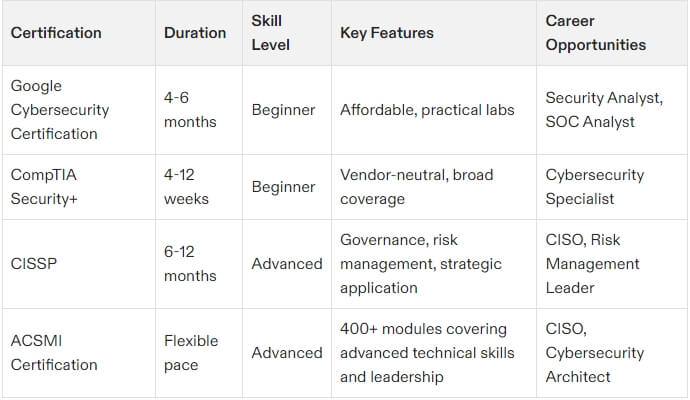Table of Contents
- Why Are Cybersecurity Certifications Important?
- Factors to Consider When Choosing a Cybersecurity Certification
- Which Cybersecurity Certification is Best for Beginners?
- Which Cybersecurity Certification is Best for Advanced Professionals?
- Best Certifications by Specialty
- Pros and Cons of Top Certifications
- Informative Table of Certifications
- FAQs
- Final Thoughts
Navigating the cybersecurity certification landscape can be overwhelming. With countless organizations offering courses tailored to different career paths and skill levels, choosing the right certification is no small task. But understanding Which Cybersecurity Certification is Best for your specific goals can significantly boost your career trajectory in this booming industry. The rise of cyber threats like data breaches, ransomware, and phishing has created an unprecedented demand for skilled cybersecurity professionals. Certifications offer a structured, proven way to gain the expertise required to mitigate these threats while also building credibility with employers. However, not all certifications are created equal. Some are designed for beginners, while others cater to professionals looking for advanced skills or leadership roles. This comprehensive blog will break down Which Cybersecurity Certification is Best, analyzing their content, depth, cost, and career impact. From entry-level programs like Google’s Cybersecurity Certification to advanced options like the ACSMI Certification with over 400 modules,
Why Are Cybersecurity Certifications Important?
The cybersecurity field is rapidly evolving, making certifications the gold standard for demonstrating up-to-date skills and expertise. They serve as validation of your knowledge in critical areas such as network security, threat intelligence, and compliance. Unlike traditional degrees, certifications are more focused, often more affordable, and faster to complete.
But how do you determine Which Cybersecurity Certification is Best? It depends on factors like your career aspirations, experience, and the niche you’d like to specialize in.
Factors to Consider When Choosing a Cybersecurity Certification
Before registering for a program, evaluate these factors to determine your ideal certification path:
1. Skill Level and Background
- Are you a beginner, intermediate professional, or seasoned expert? Programs like CompTIA Security+ suit beginners, while advanced certifications like Certified Information Systems Security Professional (CISSP) cater to industry veterans.
- A beginner may find foundational certifications crucial for learning basics, while seasoned professionals might prioritize advanced credentials for leadership roles.
2. Career Goals
- What positions are you aiming for? A Security Analyst needs different skills than a CISO or Malware Analyst. Certifications vary in their focus, so make sure the content aligns with your aspirations.
3. Content and Curriculum Depth
- Look for programs that blend theoretical frameworks with hands-on learning, such as lab simulations and real-world scenarios. For example, the ACSMI Certification offers extensive modules covering areas like advanced cryptography, zero-trust frameworks, and hardware security.
4. Course Duration
- Are you aiming for a quick pivot to cybersecurity, or can you invest more time for a deep-dive program? Programs like Google’s certification are highly time-efficient, while others like Certified Ethical Hacker (CEH) require more commitment.
5. Cost
- Affordability varies greatly. Google’s Cybersecurity Certification is affordable and beginner-friendly, while programs like Certified Information Systems Auditor (CISA) may require a higher financial investment. Advanced certifications like the ACSMI Certification often involve corporate sponsorships due to their specialized content.
6. Industry Reputation
- Employers value credible certifications backed by organizations with stellar reputations. Well-known certifications by Google, CompTIA, and (ISC)² hold more weight than lesser-known alternatives.
Which Cybersecurity Certification is Best for Beginners?
For those new to the field, entry-level certifications provide an excellent starting point.
Google Cybersecurity Certification
Google’s beginner-focused program emphasizes essential cybersecurity skills and practical knowledge. It’s a self-paced course taking around 4-6 months to complete. The program highlights basic network defense, risk management, and threat detection, making it a great choice for those transitioning into the cybersecurity field.
CompTIA Security+
Geared towards individuals with minimal IT experience, this vendor-neutral certification introduces foundational cybersecurity concepts. It also fulfills the Department of Defense 8570 compliance requirement, enhancing its value in government security roles.
Which Cybersecurity Certification is Best for Advanced Professionals?
Seasoned professionals often aim for certifications that prepare them for technical mastery or leadership roles.
Certified Information Systems Security Professional (CISSP)
Widely regarded as the gold standard for cybersecurity certifications, CISSP focuses on governance, risk management, and advanced security practices. It’s ideal for experts aspiring to managerial roles or strategic decision-making positions.
ACSMI Certification
The ACSMI Certification stands out as a robust option for advanced practitioners. With over 400 modules, the program offers unparalleled depth across areas like incident response, data protection, and AI-based threat modeling. Unlike other certifications, it blends technical learning with modules designed to enhance leadership and strategic thinking, catering to current and aspiring CISOs.
Best Certifications by Specialty
Determining Which Cybersecurity Certification is Best also depends on your area of specialization.
- Penetration Testing – Offensive Security Certified Professional (OSCP) is highly regarded.
- Cloud Security – Certified Cloud Security Professional (CCSP) is an excellent choice.
- Auditing and Compliance – CISA prepares professionals for auditing information systems.
- Leadership – The ACSMI Certification excels in preparing for senior strategic roles.
Pros and Cons of Top Certifications
Each certification has unique strengths and limitations. For instance, beginner options like Google’s program are affordable and accessible but don’t cater to advanced knowledge needs. Conversely, certifications like ACSMI provide specialized training but at a higher cost and time investment.
Informative Table of Certifications
FAQs
1. Which cybersecurity certification is best for beginners?
Google’s Cybersecurity Certification and CompTIA Security+ are ideal entry points due to their affordability and foundational focus.
2. Which certification is most recognized by employers?
Certifications from Google, CompTIA, (ISC)² (CISSP), and ACSMI are widely recognized due to their comprehensive approaches and industry relevance.
3. Can I pursue multiple certifications?
Absolutely. Many professionals start with foundational certifications and build upon them with advanced credentials like ACSMI Certification or CISSP.
4. How do I know if a certification is worth it?
Assess its alignment with your career goals, the time/cost investment, and its reputation within the industry.
5. Do certifications guarantee a job?
While no certification guarantees a job, they significantly improve your chances of securing roles by showcasing verified expertise.
Final Thoughts
Choosing Which Cybersecurity Certification is Best ultimately depends on your career stage and long-term objectives. For beginners, programs like Google’s certification provide a fast, affordable entry into the field. Advanced professionals seeking mastery and leadership opportunities should strongly consider the ACSMI Certification for its extensive curriculum and focus on strategic skills. Cybersecurity is an ongoing learning process. Whether you’re just starting or preparing to lead security teams, investing in the right certification will pave the way for boundless opportunities in this dynamic field.


Leave a Reply